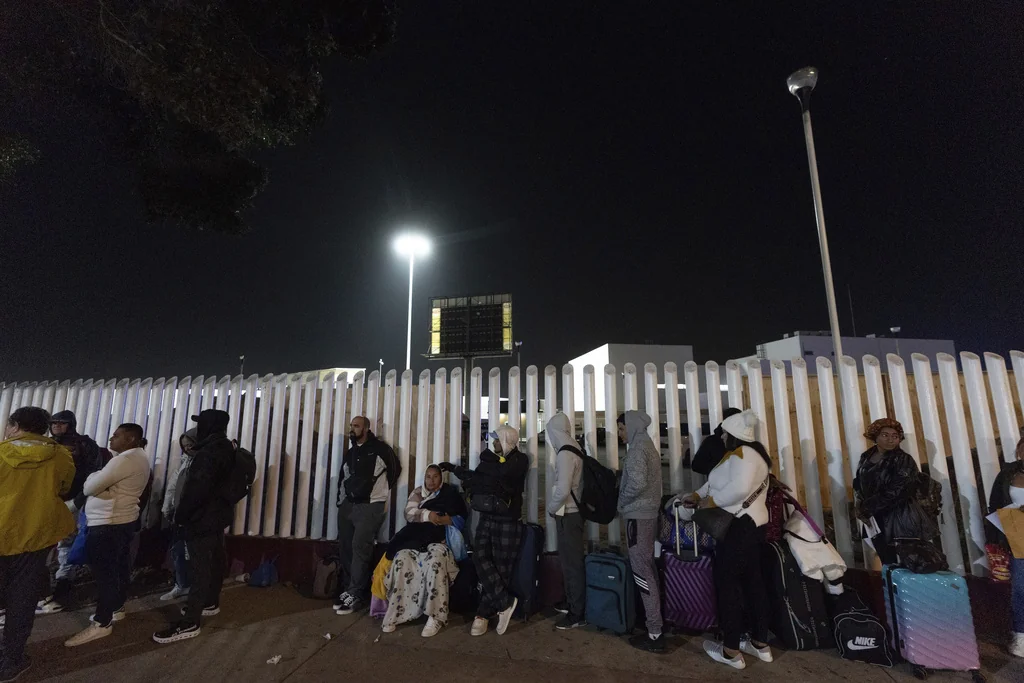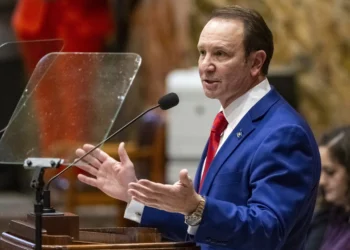The Trump administration urged the Supreme Court on Thursday to end a Biden administration-era immigration program shielding over 500,000 migrants from deportation, calling it an unlawful overreach that strains U.S. immigration courts.
Homeland Security Secretary Kristi Noem revoked the controversial parole program in March, arguing it incentivized illegal migration and failed to create a meaningful path to lawful status. But on April 14, a federal judge blocked the Trump administration’s move, leaving the program in place and setting off a high-stakes legal fight that has now reached the nation’s highest court.

President Donald Trump’s Justice Department officials warned the justices that allowing former President Joe Biden’s program to stand would force his administration to carry out time-consuming individual removal proceedings for each of the 532,000 migrants involved, placing enormous strain on already overburdened immigration courts.
“When lower courts have disregarded Congress’s commands in the Immigration and Nationality Act (INA) and usurped the Executive Branch’s control over immigration policy, this Court has not hesitated to intervene,” U.S. Solicitor General John Sauer wrote in the emergency application.
The dispute, known as Noem v. Svitlana Doe, centers on the use of parole authority under the INA, which the Biden administration used in 2022 to grant two-year entry and work authorization to migrants with U.S.-based sponsors. Advocacy groups claim the program provided vital humanitarian relief, while the Trump administration argues it was a reckless expansion of executive discretion that undermined border enforcement and national security by turning a narrow emergency tool into a backdoor pipeline for hundreds of thousands of migrants.
A coalition of advocacy groups, represented by the Justice Action Center, sued to stop Noem’s termination order, and U.S. District Judge Indira Talwani sided with them, declaring that mass termination of parole was unlawful without individualized review. The U.S. Court of Appeals for the 1st Circuit later refused to freeze that ruling.
“Everyone — sponsors, beneficiaries, communities and the economy alike — benefit from humanitarian parole,” Karen Tomlin, director of JAC, said.
Meanwhile, the DOJ has blasted the courts for interfering with executive branch powers.
“The Constitution and INA grant the Secretary and the political branches — not the courts — the task of deciding whether it is in the public interest to allow up to 532,000 aliens who were never admitted, were paroled en masse, and have not been inspected to remain in the country,” Sauer wrote.
The Supreme Court has given the immigration advocacy groups until May 15 to respond to the Trump administration’s request.
This petition filed Thursday follows a similar petition by the administration last week known as Noem v. National TPS Alliance, which sought to undo a lower court judge’s order that halted Noem’s decision to terminate the temporary protected status that was previously granted to some Venezuelans.
Lawyers representing the plaintiffs in the TPS case told the Supreme Court on Thursday to deny the government’s application to end the Biden-era program, claiming the harm that doing so would cause migrant beneficiaries outweighs the alleged harms to the United States.
COURT SHOWDOWN LOOMS OVER TRUMP PLAN TO END BIDEN’S MIGRANT PAROLE
“If the Court denies a stay now but the government later prevails, Plaintiffs would have retained TPS for a few more months during expedited litigation. The government has offered no evidence that this delay has caused or will cause any irreparable harm,” lawyers for the Venezuelan TPS recipients said, noting it would strip work authorizations for as many as 350,000 people in the country.
With over 200 legal challenges now facing Trump’s second-term policies, the case marks yet another example of the Trump administration turning to the Supreme Court to bypass lower court roadblocks and push forward on its agenda.

















